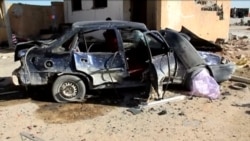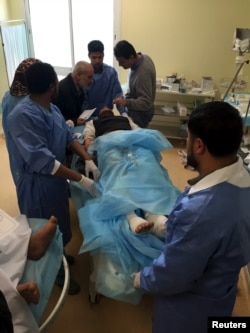A suicide truck bomb in Libya killed at least 60 police recruits Thursday at a college close to the city of Misrata. No one claimed responsibility for the attack, the deadliest bombing in Libya since the overthrow of Moammar Gadhafi in 2011.
The attack came as the Islamic State terror group continued its assault on oil facilities in Libya's east.
About 400 mostly young police recruits had gathered at a training college in the town of Zliten when the suicide attacker struck. A police officer said the attacker drove through the gate very fast in a large truck and then the bomb exploded.
Local residents helped ferry victims to hospitals in nearby Misrata.
Such attacks have become more frequent in recent months.
Islamic State militants claimed Thursday to have captured the strategic coastal town of Bin Jawad. But risk analyst Riccardo Fabiani of the Eurasia Group argued that the group’s expansion in Libya had been limited.
“The problem for IS in Libya is that they cannot really exploit religious sectarian divisions as they have in Iraq and in Syria," Fabiani said. "And most importantly, the level of support that they enjoy with the overall population in Libya is quite limited.”
In recent days IS militants have launched attacks on major oil facilities in Es Sider and Ras Lanuf, resulting in huge fires.
“Their strategy here is to attack these facilities, damage them," Fabiani said. "Why they are doing this right now is quite clear, because there is a peace deal, there is a national unity government and this is the time to basically sabotage and undermine what has been achieved so far.”
Libya’s rival administrations — one based in Tripoli and backed by Islamist groups, and the other in Tobruk, which is the internationally recognized government — signed a U.N.-negotiated power-sharing deal last month, but they have yet to form a unity government.
The U.N. envoy to Libya, Martin Kobler, is calling for Libyans to back the deal and unite against terrorism.






